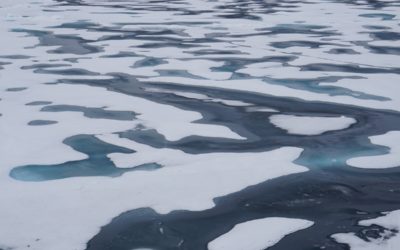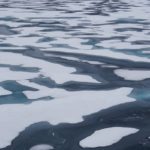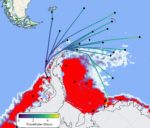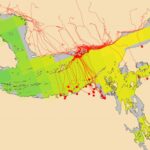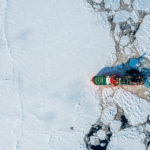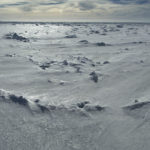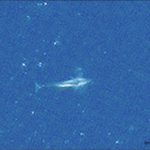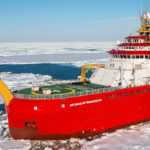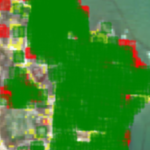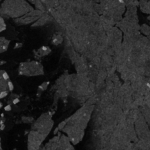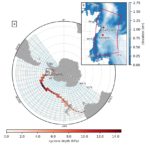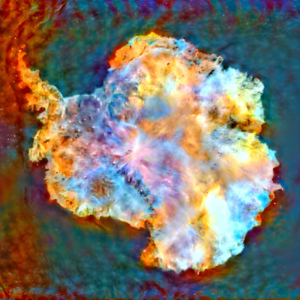Artificial Intelligence (AI) Lab
The British Antarctic Survey’s Artificial Intelligence (AI) Lab is at the forefront of innovative research and innovation, employing AI and machine learning techniques to tackle a broad spectrum of challenges within the institute’s remit. From sea ice forecasting and space weather, ice dynamics and sea level rise, seasonal polar operations and automation, to tracking wildlife and icebergs from space and benthic biology on the seafloor.
Extracting knowledge from the diverse range of datasets and domain areas which span various spatial and time scales poses significant challenges. The BAS AI Lab leverages the power of AI to intelligently integrate different types of data to pave the way for new discoveries and unlocking previously inaccessible information.
One of the AI Lab’s focuses is optimising data collection processes in remote and hostile environments to reduce carbon emissions and maximise science output. By integrating satellite observations, surface sensors, and optimising task planning for infrastructure and logistics (including ships and autonomous marine vehicles) the AI Lab strives to streamline data acquisition and improve the efficiency of scientific expeditions. This approach ensures that valuable resources are used sustainably, minimising carbon footprint.
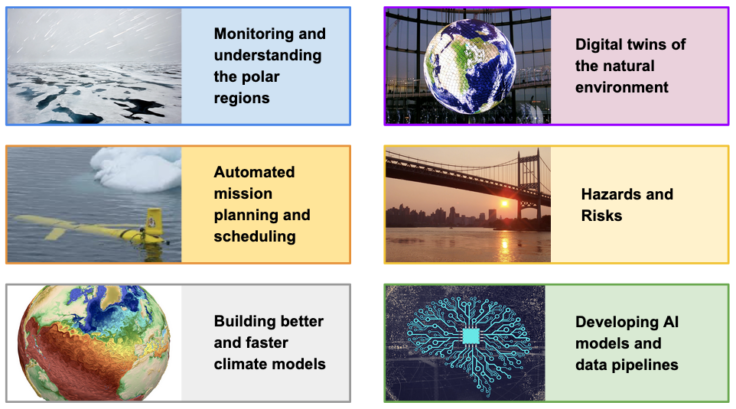
As a leading national entity, BAS’s AI Lab actively collaborates with national and international partners to co-develop and co-deliver AI methods that are tailored to meet the unique requirements of polar research. By working closely with experts from diverse backgrounds, the lab ensures that the developed AI techniques are fit for purpose and aligned with global standards to enable wider adoption.
An important aspect of the AI Lab’s mission is to put novel, freely available digital solutions into the hands of decision-makers. By leveraging the power of AI, the lab creates operational tools and technologies that aid policymakers and stakeholders in making informed decisions to safeguard our planet. These solutions provide valuable insights and enable proactive mitigation and adaptation measures to help address the climate and biodiversity crisis.
PhD opportunities
- Centre for Doctoral Training (CDT) in the Application of Artificial Intelligence to the study of Environmental Risks, University of Cambridge and British Antarctic Survey
IceNet
IceNet is a probabilistic, deep learning sea ice forecasting system developed by an international team and led by British Antarctic Survey and The Alan Turing Institute [Andersson et al., 2021]. …Autonomous Marine Operations Planning
AI systems will provide automated decision support in polar navigation delivering optimal fuel economy and minimising carbon emissions.AI for smart conservation
In the AI for smart conservation project, BAS are collaborating with local ecologists and conservation agencies to develop decision-making tools informed by sea ice forecasts. By combining satellite observations, GPS …DI4EDS
Environmental research relies on digital infrastructure (hardware, software and methods) to provide services that help researchers answer questions about the environment around us, and innovators to work out ways that …Using AI to track icebergs
23 November, 2023
Researchers are using a new AI tool to detect icebergs in the Southern Ocean. This is the first step towards scientists being able to track the complete life cycle of …
AI tool to revolutionise polar ship navigation
15 November, 2022
Artificial Intelligence (AI) will enable ships navigating in polar ocean conditions to be more efficient using a new route planning tool created by British Antarctic Survey (BAS) researchers. The tool …
Space technology and artificial intelligence to monitor whale mass stranding events
18 November, 2021
An international team of scientists led by British Antarctic Survey have published research today on using new technology to study mass stranding of whales from space and how the technology …
Artificial intelligence to help predict Arctic sea ice loss
26 August, 2021
A new AI (artificial intelligence) tool is set to enable scientists to more accurately forecast Arctic sea ice conditions months into the future. The improved predictions could underpin new early-warning …
Using AI to track whales from space
4 February, 2021
British Antarctic Survey (BAS) scientists will work with an Artificial Intelligence company after being awarded a contract from the Canadian Space Agency (CSA) to support the protection of an endangered …
PhD centre will nurture new leaders in Earth observation
9 January, 2020
A new centre will enable 50 fully-funded PhD researchers to harness satellite data to tackle global environmental challenges. The Centre for Satellite Data in Environmental Science (SENSE) will bring together expertise in …
Using AI to help tackle global environmental challenges
26 February, 2019
A new Centre for Doctoral Training, involving researchers from British Antarctic Survey, will develop Artificial Intelligence (AI) techniques to address critical environmental challenges. Climate change and environmental hazards pose some …
Watching whales from space
1 November, 2018
Scientists have used detailed high-resolution satellite images provided by Maxar Technologies’ DigitalGlobe, to detect, count and describe four different species of whales. Reported this week in the journal Marine Mammal …
Seeing double: Digital twins and net zero
5 July, 2022 by Jonathan Smith
Reaching net zero, as a country or a business, requires new measures, technology and innovations. Digital twins are an example of this; they can be a powerful tool to drive innovation and efficiency.
BLOG: Predicting September 2021 Arctic sea ice using artificial intelligence
24 September, 2021 by Tom Andersson
Tom Andersson, a data scientist at British Antarctic Survey Artificial Intelligence (AI) Lab, shares the latest predictions from a new Arctic sea ice forecasting AI tool as this year’s Arctic …
Innovative Research Sprints Tackle Challenges in Biodiversity and Exposure
11 May, 2021 by Anita Faul
Over the last decade, digital technologies, including Artificial Intelligence, developed rapidly as did our capability to monitor our home planet from space with Earth Observation satellites. How can we most …
Earth Day 2020: A new age of Arctic science discovery – the AI way
24 April, 2020 by Scott Hosking
When we see news reports on climate change on our TV, they are often accompanied by footage of a polar bear walking over the icy Arctic landscape. But the Arctic …
Official launch of the BAS AI Lab!
4 December, 2019 by Risa Ueno
Today we officially launched the BAS AI Lab – thank you everyone for coming!
AI Lab presents at the First Artificial Intelligence for Copernicus Workshop
22 November, 2019 by Anita Faul
Andrew Fleming and Anita Faul present their research at the First Artificial Intelligence for Copernicus Workshop
Machine Learning for Environmental Sciences
21 July, 2019 by Rachel Furner
Rachel Furner is a PhD student at British Antarctic Survey, which has recently opened up its new AI Lab, that aims to foster the application of various machine learning (and …
Data Study Group: Automated monitoring of seals via high-resolution satellite imagery
8 April, 2019 by Premdeep Gill
Prem hosted at Data Study Group at the Alan Turing Institute Seals from space: automated Antarctic ecosystem monitoring via high-resolution satellite imagery Antarctic seal populations are potential indicators for the …
Automated clustering of storm tracks for interpreting ice core records
22 August, 2017 by Scott Hosking
Accumulation in coastal West Antarctic ice core records and the role of cyclone activity Cyclones are an important component of Antarctic climate variability, yet quantifying their impact on the polar …
WAVI.jl: Ice Sheet Modelling in Julia
14 March, 2024 by Alexander Bradley, Rosie Williams, David Bett, James Byrne, Robert Arthern
Ice sheet models are used to improve our understanding of the past, present, and future evolution of ice sheets. To do so, they solve the equations describing the flow of…Sea ice detection using concurrent multispectral and synthetic aperture radar imagery
4 March, 2024 by Andrew Fleming, Scott Hosking, Jeremy Wilkinson, Maria Fox, Martin Rogers
Synthetic Aperture Radar (SAR) imagery is the primary data type used for sea ice mapping due to its spatiotemporal coverage and the ability to detect sea ice independent of cloud…Read more on Sea ice detection using concurrent multispectral and synthetic aperture radar imagery
Interrogating Sea Ice Predictability with Gradients
14 February, 2024 by Scott Hosking
Predicting sea ice concentration is an important task in climate analysis. The recently proposed deep learning system IceNet is the state of the art sea ice prediction model. IceNet takes…Read more on Interrogating Sea Ice Predictability with Gradients
Review of Satellite Remote Sensing and Unoccupied Aircraft Systems for Counting Wildlife on Land
8 February, 2024 by Ellen Bowler, Hannah Cubaynes, Marie Attard, Penny Clarke, Peter Fretwell, Richard Phillips
Although many medium-to-large terrestrial vertebrates are still counted by ground or aerial surveys, remote-sensing technologies and image analysis have developed rapidly in recent decades, offering improved accuracy and repeatability, lower…Prioritize environmental sustainability in use of AI and data science methods [Comment]
26 January, 2024 by Scott Hosking
Artificial Intelligence (AI) and data science will play a crucial role in improving environmental sustainability, but the energy requirements of these methods will have an increasingly negative effect on the…Read more on Prioritize environmental sustainability in use of AI and data science methods [Comment]
Unsupervised machine learning detection of iceberg populations within sea ice from dual-polarisation SAR imagery
1 November, 2023 by Andrew Fleming, Anita Faul, Ben Evans, David Vaughan, Scott Hosking
Accurate quantification of iceberg populations is essential to inform estimates of Southern Ocean freshwater and heat balances as well as shipping hazards. The automated operational monitoring of icebergs remains challenging,…Histopathological screening of Pontogammarus robustoides (Amphipoda), an invader on route to the United Kingdom
1 September, 2023 by Martin Rogers
Biological invasions may act as conduits for pathogen introduction. To determine which invasive non-native species pose the biggest threat, we must first determine the symbionts (pathogens, parasites, commensals, mutualists) they…Using Probabilistic Machine Learning to Better Model Temporal Patterns in Parameterizations: a case study with the Lorenz 96 model
10 August, 2023 by Scott Hosking, Raghul Parthipan
The modelling of small-scale processes is a major source of error in climate models, hindering the accuracy of low-cost models which must approximate such processes through parameterization. Red noise is…Environmental sensor placement with convolutional Gaussian neural processes
3 August, 2023 by Dani Jones, Scott Hosking, Tom Andersson
Environmental sensors are crucial for monitoring weather conditions and the impacts of climate change. However, it is challenging to place sensors in a way that maximises the informativeness of their…Read more on Environmental sensor placement with convolutional Gaussian neural processes
Self-Recover: Forecasting Block Maxima in Time Series from Predictors with Disparate Temporal Coverage Using Self-Supervised Learning
1 August, 2023 by Andrew McDonald
Forecasting the block maxima of a future time window is a challenging task due to the difficulty in inferring the tail distribution of a target variable. As the historical observations…Autoregressive Conditional Neural Processes
1 March, 2023 by Scott Hosking, Tom Andersson
Conditional neural processes (CNPs; Garnelo et al., 2018a) are attractive meta-learning models which produce well-calibrated predictions and are trainable via a simple maximum likelihood procedure. Although CNPs have many advantages,…The downstream impacts of dams on the seasonally flooded riverine forests of the Mekong River in northeastern Cambodia
1 January, 2023 by Michael Thorne
On the Mekong River, north of Stung Treng town in northeastern Cambodia, and below the border with Laos, lies an area of riverine seasonally flooded forest designated as an internationally…Species-specific and seasonal differences in the resistance of salt-marsh vegetation to wave impact
14 December, 2022 by Ben Evans
The coastal protection function provided by the vegetation of tidal wetlands (e.g. salt marshes) will play an important role in defending coastlines against storm surges in the future and depend…A sensitivity analysis of a regression model of ocean temperature
30 August, 2022 by Dave Munday, Dani Jones, Rachel Furner
There has been much recent interest in developing data-driven models for weather and climate predictions. However, there are open questions regarding their generalizability and robustness, highlighting a need to better…Read more on A sensitivity analysis of a regression model of ocean temperature
Tipping cycles
1 August, 2022 by Michael Thorne
Instability in Jacobians is determined by the presence of an eigenvalue lying in the right half plane. The coefficients of the characteristic polynomial contain information related to the specific matrix…Efficient Temporal Piecewise-Linear Numeric Planning with Lazy Consistency Checking
1 August, 2022 by Maria Fox
Temporal planning often involves numeric effects that are directly proportional to their action’s duration. These include continuous effects, where a numeric variable is subjected to a rate of change while…Read more on Efficient Temporal Piecewise-Linear Numeric Planning with Lazy Consistency Checking
Microsporidia: a new taxonomic, evolutionary, and ecological synthesis
1 August, 2022 by Martin Rogers
Microsporidian diversity is vast. There is a renewed drive to understand how microsporidian pathological, genomic, and ecological traits relate to their phylogeny. We comprehensively sample and phylogenetically analyse 125 microsporidian…Read more on Microsporidia: a new taxonomic, evolutionary, and ecological synthesis
Localized impacts and economic implications from high temperature disruption days under climate change
20 May, 2022 by Charles Simpson, Erik Mackie, Scott Hosking, Risa Ueno
Most studies into the effects of climate change have headline results in the form of a global change in mean temperature. More useful for businesses and governments, however, are measures…Vegetation interactions with geotechnical properties and erodibility of salt marsh sediments
5 February, 2022 by Ben Evans
Salt marshes provide diverse ecosystem services including coastal protection, habitat provision and carbon sequestration. The loss of salt marshes is a global scale phenomenon, of great socio-economic concern due to…The Time Machine framework: monitoring and prediction of biodiversity loss
1 February, 2022 by Scott Hosking
Transdisciplinary solutions are needed to achieve the sustainability of ecosystem services for future generations. We propose a framework to identify the causes of ecosystem function loss and to forecast the…Read more on The Time Machine framework: monitoring and prediction of biodiversity loss
AI Lab Leadership

- Scott Hosking (Leader)

- Maria Fox (Deputy)
Share this
Featured
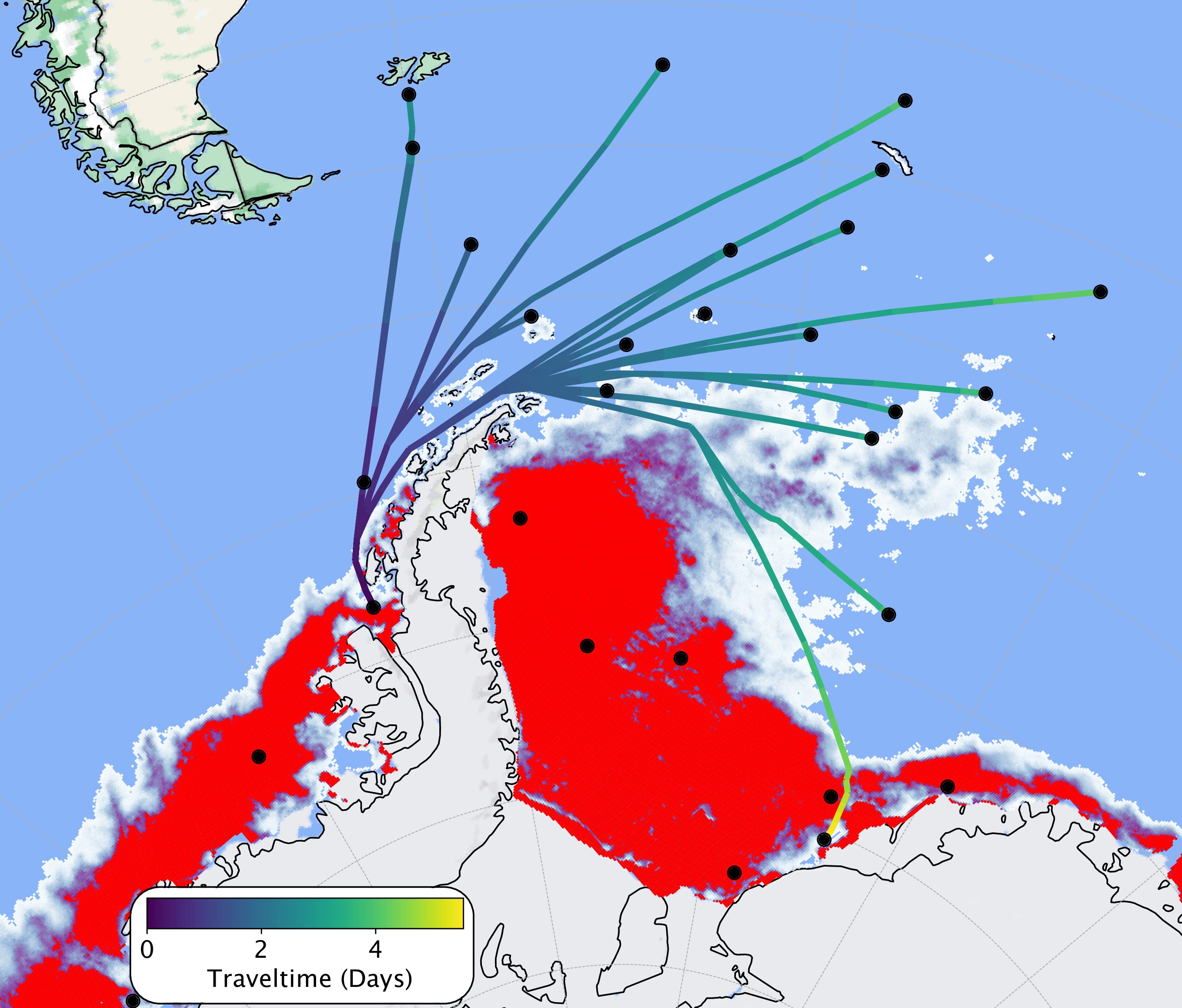
Autonomous Marine Operations Planning
